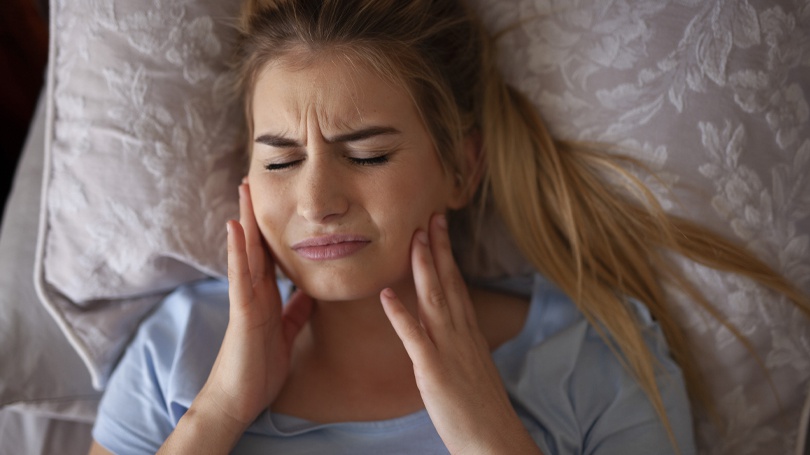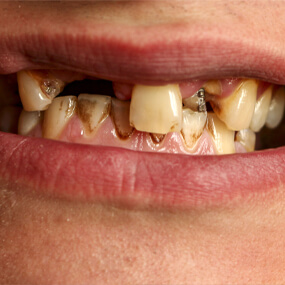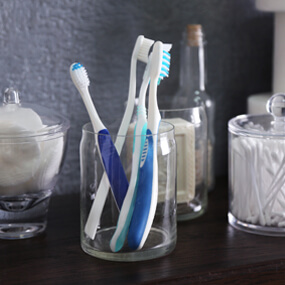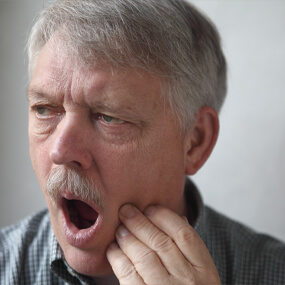COVID-19-Related Stress Leads to Teeth Grinding Uptick

The COVID-19 pandemic has taken a toll on us all. Even if you have not been directly affected by the virus, you probably have experienced anxiety related to social distancing and business closures. If you have recently noticed that your muscles are unusually tight or that you are more fatigued than normal, those are conditions that can be symptoms of that additional stress. Teeth grinding is another symptom that may not be as readily apparent and can often be disguised as other indicators.
Teeth Grinding as a Response to Stress
Dentists are the medical professionals who often first diagnose bruxism—characterized by teeth grinding and jaw clenching—and dentists throughout North America have noticed a surge in cases. Some of these cases have been severe enough to result in cracked and even fractured teeth. Big data reveals that this not just a matter of a sample size but an actual trend, and since stress is a leading cause of bruxism, it is not difficult to draw a connection between the pandemic and the rise in cases.
A recent New York Times article written by a specialist in dental prosthetics, Dr. Tammy Chen, described how she had treated more tooth fractures in the previous six weeks than she had in the last six years. In March, when her clinic was closed due to the lockdown, she received many calls from waiting patients who were experiencing sore jaws, headaches, tense muscles, and teeth grinding. When she was able to reopen in June, she has averaged almost four tooth fractures a day. Not an office day has gone by for her without a tooth fracture, and on the bad days, she can see six or even more.
Stress linked to the pandemic is undoubtedly a factor, but Chen recognized other influences as well. Consider that more people are working from home. In many cases, this has led to makeshift workspaces and thus poor ergonomics. Poor posture is another trigger for teeth grinding. Many people also are not sleeping as well, which has developed into chronic insomnia for some. Inadequate sleep can lead to teeth grinding and jaw clenching in addition to headaches, muscle aches, and many other issues.
Understanding Bruxism
Bruxism is an involuntary parafunction. It is the use of your jaw in a manner outside the normal range of behavior. People with bruxism often clench their jaws with great force, and they often rub their upper teeth against their lower teeth, which can have many consequences beyond just damaging the teeth.
While there is nothing wrong with momentary clenching of your jaw, reoccurrence in an uncontrolled manner and over a long period damages the teeth, puts undue stress on the jaw, neck, and facial muscles, and can interrupt sleep to the point of developing into chronic insomnia. This condition can be either acute or chronic, and it can occur at any age when there is a dysfunction of the temporomandibular joint. Your TMJ is fundamental to many oral activities that we often take for granted, such as talking or chewing.
Stress and tension, coupled with a bad bite, is a combination that will often trigger bruxism. Even when the force is not great enough to fracture the teeth, the repetitive clenching and grinding will wear the teeth down and can cause injuries to soft tissues in the mouth. The repetitive action can also lead to muscle discomfort, headaches, and even migraines in some people.
Indications of bruxism include:
- Tooth fractures
- Tooth sensitivity
- Jaw and face pain
- Soft tissue wounds
- Reduced oral mobility
- Wear on molar surfaces
- Damage to oral restorations
- Discomfort when chewing or talking
Bruxism: Types and Treatments
Bruxism is most commonly thought of as a sleep disorder—nocturnal bruxism—but it can also happen when one is conscious—called awake bruxism. Among adults, pandemic-related stress is most likely to manifest as nocturnal bruxism. Prior to the pandemic, the estimate was that 12 percent of the adult population was affected, and the number is almost certainly higher during the pandemic.
In fact, some current estimates have the number as high as 38 percent, which is an increase of more than three times. This figure accounts for acute cases as well, which come and go. But even temporary cases can cause a great deal of damage and should be treated. In order to limit stressors:
- Strive to maintain a regular schedule. This is particularly important when working from home. Establish a bedtime and a routine that you carry out each night in the lead-up to it.
- Avoid information overload and do not go to bed with a bunch of new information to process. Televisions, laptops, tablets, books, and so forth should ideally be kept out of the bedroom.
- Exercise is important to your mental health. Even with your local gym closed, you can get enough cardio in at home without equipment to relieve much of the stress burdening you.
- Keep in touch with family and friends. Aim to socialize beyond just texts and Facebook. A telephone call or video conference with a loved one can be just as healing as an in-person visit.
- Do not be afraid to get professional psychological support if you need it.
- You should discuss getting a custom mouth guard with your dentist. This is an oral appliance that protects your teeth and soft tissues and is a common way to treat bruxism symptoms.
- If the bruxism has caused muscle discomfort, physiotherapy may be needed to deal with it.
What Is a Custom Mouth Guard?
The technical term for a custom mouth guard is an occlusal splint. An occlusal splint is often an acrylic mouthpiece that is custom-fitted to the upper teeth. This protects both the upper and lower teeth from grinding, and it can evenly redistribute the forces that occur when clenching. It can also maintain the ideal jaw position, which can help with breathing. These are generally worn at night, and most people acclimate to them within just a few days. While there are generic over-the-counter options available, a custom guard is more effective. It will also last longer and thus be more cost-effective in the end.
It is important to note that an occlusal splint treats the symptoms and not the condition itself. If you were to stop using your night guard, the problems would reappear. In many cases, treating the symptoms is deemed sufficient. But if the bruxism is severe, then you may need treatment by a physiotherapist in addition to carrying out a number of lifestyle changes.
Protect Your Teeth From Bruxism
The best way to safeguard yourself from bruxism is to see your dentist on a regular basis. Your dentist can identify the earliest signs of the condition and recommend treatment accordingly. Jeffrey D. Clark, DDS, is a leading dentist in the Greater Scottsdale area who is highly skilled and experienced in the creation of custom-fitted occlusal splints. He has helped many patients managed their bruxism through the use of custom night guards. Call Scottsdale Cosmetic Dentistry Excellence at 480 585 1853 with any questions about our mouth guards and to schedule an appointment.




